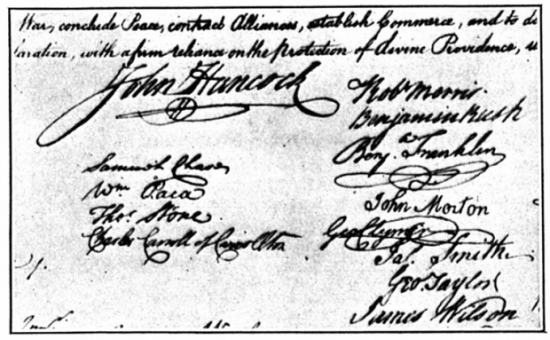
John Hancock (president of the Continental Congress), Josiah Bartlett, William Whipple, Matthew Thornton, Samuel Adams, John Adams, Robert Treat Paine, Elbridge Gerry, Stephen Hopkins, William Ellery, Roger Sherman, Samuel Huntington, William Williams, Oliver Wolcott, William Floyd, Philip Livingston, Francis Lewis, Lewis Morris, Richard Stockton, John Witherspoon, Francis Hopkinson, John Hart, Abraham Clark, Robert Morris, Benjamin Rush, Benjamin Franklin, John Morton, George Clymer, James Smith, George Taylor, James Wilson, George Ross, Caesar Rodney, George Read, Thomas McKean, Samuel Chase, William Paca, Thomas Stone, Charles Carroll of Carrollton, George Wythe, Richard Henry Lee, Thomas Jefferson, Benjamin Harrison, Thomas Nelson, Jr., Francis Lightfoot Lee, Carter Braxton, William Hooper, Joseph Hewes, John Penn, Edward Rutledge, Thomas Heyward, Jr., Thomas Lynch, Jr., Arthur Middleton, Button Gwinnett, Lyman Hall, and George Walton.
There were 56 signers of the Declaration of Independence. Among some of the more well known facts about the people who signed the Declaration of Independence are that John Hancock’s signature was the largest, or that several future Presidents (John Adams and Thomas Jefferson to be exact) signed the Declaration. Samuel and John Adams were both signers of the document. These cousins were close friends and comrades in politics. But aside from the trivia it is important to remember the significance of the document.
The Declaration of Independence was just that, a declaration to the British that the American colonies were to be independent of their rule. The Declaration of Independence was the catalyst for the changes in government and the establishment of the freedoms we have today. America was to become the envy of all other nations because of our mission for the pursuit of happiness. The Declaration of Independence was much more than an opportunity for rebellious and political men to make a statement or to boost their own egos. It was a document that carried with it severe consequences as well as priceless gifts for future generations.
In signing their names to the Declaration of Independence, the signers were effectively signing away their protection and anonymity from British forces. John Hancock, president of the Continental Congress, probably had the most cause for fear as he was the leader of the revolution against the British. True, he was described as a flamboyant character who liked attention. But his large signature on the Declaration of Independence was not to boast his own ego. It was a powerful response to a decree that had been delivered from England in early 1776 offering a large reward for his capture and the capture of several leading figures. On signing the Declaration in his famously clear and obvious way he commented, “The British ministry can read that name without spectacles; let them double their reward.”
In the time following the signing of the Declaration of Independence we see that the British threats were serious, as five signers were captured by the British as traitors, and tortured before they died. This was done because at the time, the signing of the Declaration of Independent was an act by the signers to fight their own government. Twelve had their homes ransacked and burned, losing all of their earthly possessions. Two lost their sons serving in the Revolutionary Army; another had two sons captured. Nine of the fifty six fought and died from wounds or hardships of the Revolutionary War.
Yet with all of the risks, these 56 men knew that in order to create the nation of freedom that they dreamed of, they would need to take a stand. These men were influential, wealthy, popular, educated, and talented. They represented leading authorities in many professions. Thomas Jefferson alone was a lawyer, agronomist, musician, scientist, philosopher, author, architect, inventor, and statesman. These men had everything to lose and risked it all to declare that citizens of America would no longer be forced to be subject to the whims of unfair British rule. Because they did, we live in a nation with liberty and justice; a nation that is united and seeks to foster general welfare and justice for all of us who have the privilege of being Americans.
